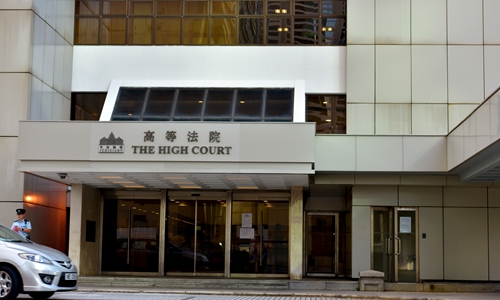HOME >> OPINION
Hong Kong bears brunt of big power games
Source:Global Times Published: 2019/11/18 22:43:40

Photo: IC
After fierce clashes between radical protesters and police on Sunday, Hong Kong's High Court ruled that the anti-mask law, which was passed according to the Emergency Regulations Ordinance, is "unconstitutional." This has encouraged radical protesters and increased the difficulties for police to maintain Hong Kong's order in accordance with the law.
The Hong Kong Special Administrative Region government still has the opportunity to appeal, which means there might be a chance to reverse the decision. But the court's ruling has already caused a major negative effect.
The latest development in Hong Kong affairs demonstrates how complex the situation is - far more than confrontations between radical rioters and police.
Many people feel that what is happening in Hong Kong is somehow connected with worsening China-US ties. Such a hunch is correct.
Hong Kong returned to China in 1997 and is an inseparable part of China. It is an interface between China and the West. China-West relations were generally good when the "one country, two systems" principle was first implemented. There had been frictions, but were relatively easy to resolve.
Since China-US ties became remarkably complicated when the US labeled China a strategic competitor, the US promoted its ideological and value confrontation against China at the national level. The change in Washington has mobilized some radical forces in the West to challenge Beijing, creating the most prominent and long-lasting tension between China and the West.
As a result, problems emerged in Hong Kong, the interface linking China and the West. The US and certain Western forces no longer have the willingness to maintain the function of the bonder. Worse, they started to proactively harm it.
The rule of law, the core value of Hong Kong, has lost its authority in curbing violence. And those activities are supported by the US policy toward Hong Kong, and - in fact - toward China. Since China exercises sovereignty over Hong Kong, the ability of the US and some Western forces to intervene in Hong Kong has become limited. All this has led to a deadlock of the unrest sparked by the now-withdrawn extradition bill, and violence has been intensifying.
Hong Kong has prospered due to its role as the interface between China and the West. Such a position made it unique throughout East Asia. Once the US or Chinese mainland decides to give up this interface, the future of Hong Kong will be disastrous.
The US is hell-bent on passing the "Hong Kong Human Rights and Democracy Act," which is Washington's threat to abandon this interface.
The right approach for Hong Kong society is to take the initiative to maintain its role as the interface between China and the West. It should not provide opportunities for external forces to destroy this position.
The unrest sparked by the now-withdrawn extradition bill has almost ruined the rule of law in and the modernity of Hong Kong. Even if Hong Kong returns to calm, rebuilding order and institutions would be extremely difficult. It cannot be guaranteed whether Hong Kong is able to regain many of its advantages as an international financial center. It is time for Hong Kong society to be concerned about its own future.
Only if and when the entire population of Hong Kong stands up together and turns the tide, can the city escape this misfortune. A city's fate depends first of all on itself.
RELATED ARTICLES:
Posted in: EDITORIAL